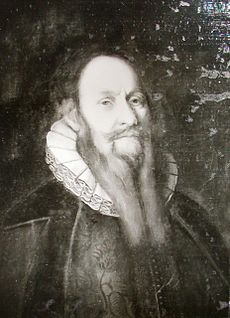Laurentius Paulinus Gothus
|
The Most Reverend Laurentius Paulinus Gothus |
|
|---|---|
| Archbishop of Uppsala Primate of Sweden |
|
 |
|
| Church | Church of Sweden |
| Archdiocese | Uppsala |
| Appointed | 1637 |
| In office | 1637–1646 |
| Predecessor | Petrus Kenicius |
| Successor | Johannes Canuti Lenaeus |
| Orders | |
| Consecration | 3 August 1608 by Olaus Martini |
| Rank | Metropolitan Archbishop |
| Personal details | |
| Born |
November 10, 1565 Söderköping, Sweden |
| Died | April 23, 1669 (aged 95) Uppsala, Sweden |
| Buried | Strängnäs Cathedral |
| Nationality | Swede |
| Parents | Påvel Pedersson Karin Pedersdotter |
| Spouse | Catharina Olofsdotter (Till 1623) Brita Eriksdotter |
| Previous post |
Bishop of Skara (1608–1609) Bishop of Strängnäs (1609–1637) |
| Alma mater | Uppsala University |
Laurentius Paulinus Gothus (November 10, 1565 – November 29, 1646) was a Swedish theologian, astronomer and Archbishop of Uppsala (1637–1645).
In 1588 Gothus travelled to Germany and studied in the for three years. He was influenced by Pierre de la Ramée (also known as Petrus Ramus) and his philosophy rather than the Lutheran scholastics.
After getting an M.A., he returned home to Uppsala in time for the Uppsala Synod in 1593 where the founding dogmas of the Swedish Lutheran Church were made final. He was appointed professor of logic at the recently reopened, and now Lutheran focused, Uppsala University. In 1598 he re-transferred himself to the professorship in astronomy.
He was, along with some other professors, suspended from his duty in 1606, because the archbishop of 1600 had demanded the professors to sign a petition supporting the recently crowned Sigismund of Sweden. In 1606, his antagonist Duke Charles was crowned and was not too happy about this.
When a comet appeared on the sky in 1607, Laurentius declared he could interpret what this signified. The belief in astrology and the significance of heavenly signs were still strong (see for instance, astronomer Tycho Brahe), and Laurentius was no exception. His interpretations made him important for the King, he reinstated him at the university.
A while later, he got involved in philosophical disputes with the professor in philosophy, Jonas Magni, who was an adherent of Aristotle. Laurentius's had from Ramée acquired a scepticism towards this philosophy and defended his views rigorously.
...
Wikipedia
